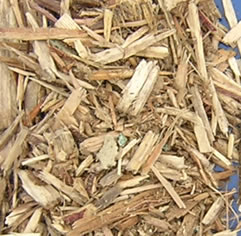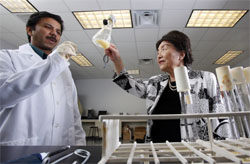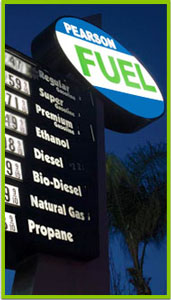 The amount of industrial fats and oils in the U.S. has grown by nearly one-fourth over the past couple of years, fueled mostly by the growth in popularity of biodiesel.
The amount of industrial fats and oils in the U.S. has grown by nearly one-fourth over the past couple of years, fueled mostly by the growth in popularity of biodiesel.
This story in ICIS Chemical Business says the US Department of Agriculture’s (USDA) Economic Research Service (ERS) reports fats and oils used for industrial applications in the U.S. rose last year to an estimated 11.9 billion lbs, up by 9% from 2007, and by 24% from 2006:
Methyl esters, or biodiesel, was the biggest factor in the increase in fats and oils use, while applications in lubricants and similar oils also had significant spikes, the USDA reported in its 2009 Oil Crops Yearbook.
An estimated 700m gallons of US biodiesel was produced last year, according to the National Biodiesel Board (NBB). Around 34% of biodiesel raw material came from refined soybean oil, 31% from crude soybean oil, 11% from inedible tallow and grease, and 24% from other fats and oils.
“The production of US biodiesel, which now accounts for over 75% of soybean oil’s industrial use, experienced an annual average growth rate of an astonishing 90% for most of this decade,” says Kenneth Doll, research chemist, Food and Industrial Oil Research Unit at the USDA’s Agriculture Research Service (ARS).
The article goes on to say the American numbers match the worldwide trend in industrial oils use.


 America’s first eco-sustainable city is taking its first steps toward sustainable energy.
America’s first eco-sustainable city is taking its first steps toward sustainable energy. Today’s Earth Day Celebration is brought to you in part by the book, “Green Hell” written by Steve Milloy. I’ve never met or spoken to the man, but I can presume that he is not a celebrator of Earth Day since his entire book is dedicated to stopping the “greens.” The premise of his book is to educate the public on how environmentalists are trying to control our lives and what we can do to stop them. He writes, “While it is beyond the scope of this book to debunk the scientific claims of global warmists, we’ll take a brief moment here to note the fatal flaw of global warming alarmism: there is no scientific evidence indicating that carbon dioxide, much less man made carbon dioxide emissions, control or even measurably impact global climate.”
Today’s Earth Day Celebration is brought to you in part by the book, “Green Hell” written by Steve Milloy. I’ve never met or spoken to the man, but I can presume that he is not a celebrator of Earth Day since his entire book is dedicated to stopping the “greens.” The premise of his book is to educate the public on how environmentalists are trying to control our lives and what we can do to stop them. He writes, “While it is beyond the scope of this book to debunk the scientific claims of global warmists, we’ll take a brief moment here to note the fatal flaw of global warming alarmism: there is no scientific evidence indicating that carbon dioxide, much less man made carbon dioxide emissions, control or even measurably impact global climate.” solar energy into his business. “Our primary motivator was to produce wines in a way that honors this beautiful coastal area and respects the environment. Conergy’s solutions enable Eos to optimize power generation throughout the day, avoiding the hours of shading confronted by standard systems set to peak hour production,” he noted. “These efficiencies — coupled with the government incentives associated with this project — made the economics of installing these remarkable earth-friendly systems viable,” Hopmayer said.
solar energy into his business. “Our primary motivator was to produce wines in a way that honors this beautiful coastal area and respects the environment. Conergy’s solutions enable Eos to optimize power generation throughout the day, avoiding the hours of shading confronted by standard systems set to peak hour production,” he noted. “These efficiencies — coupled with the government incentives associated with this project — made the economics of installing these remarkable earth-friendly systems viable,” Hopmayer said. Georgia has become the third state to pass a bill requiring suppliers to make available an unblended gasoline grade for marketers who want to make their own ethanol fuels. The measure awaiting the signature of Republican Gov. Sonny Perdue would require refiners to supply a straight-run gasoline for blending by July 1 this year. Refiners also would be barred from interfering with a jobber’s right to blend alcohol or claim federal tax credits on blended fuel, and would have to amend their supply contracts to delete any ban on blend sales.
Georgia has become the third state to pass a bill requiring suppliers to make available an unblended gasoline grade for marketers who want to make their own ethanol fuels. The measure awaiting the signature of Republican Gov. Sonny Perdue would require refiners to supply a straight-run gasoline for blending by July 1 this year. Refiners also would be barred from interfering with a jobber’s right to blend alcohol or claim federal tax credits on blended fuel, and would have to amend their supply contracts to delete any ban on blend sales. The police department in Hoover, Alabama will soon be receiving wood-based ethanol to fuel their flexible fuel vehicles (FFVs). A Livingston demonstration plant, Gulf Coast Energy, will be producing the ethanol.
The police department in Hoover, Alabama will soon be receiving wood-based ethanol to fuel their flexible fuel vehicles (FFVs). A Livingston demonstration plant, Gulf Coast Energy, will be producing the ethanol.
 Officials with
Officials with  Both houses of Congress have now introduced a bill that would give consumers more choices at the pump.
Both houses of Congress have now introduced a bill that would give consumers more choices at the pump. An increasing number of university professors, scientists, researchers, and industry trade organizations have registered their opposition to the controversial proposal because they say incomplete and unproven modeling is being used to penalize renewable fuels.
An increasing number of university professors, scientists, researchers, and industry trade organizations have registered their opposition to the controversial proposal because they say incomplete and unproven modeling is being used to penalize renewable fuels.  Happy Earth Day, everybody!!
Happy Earth Day, everybody!!